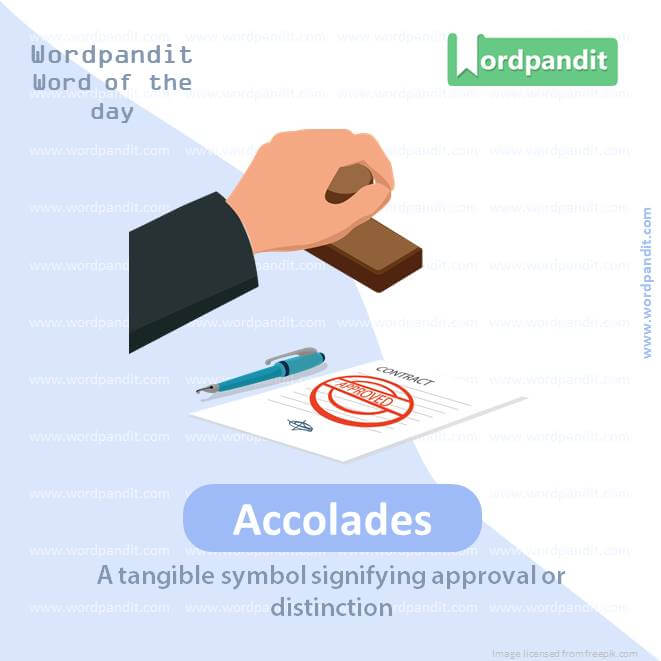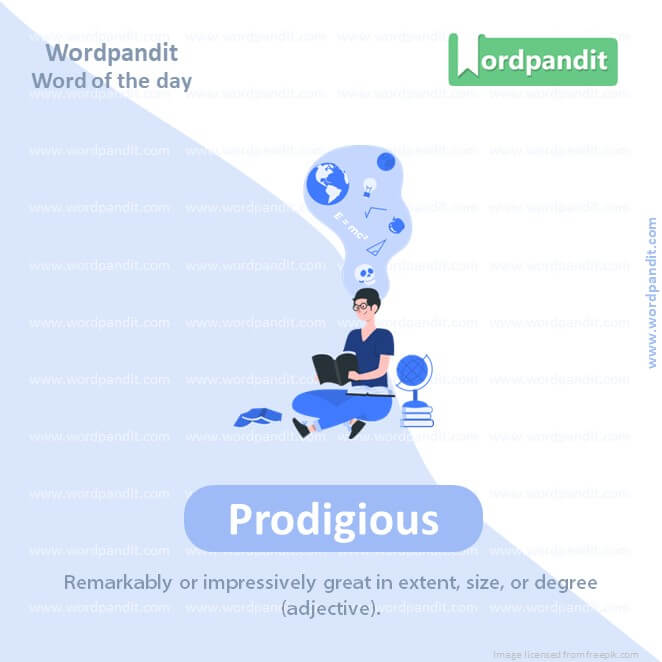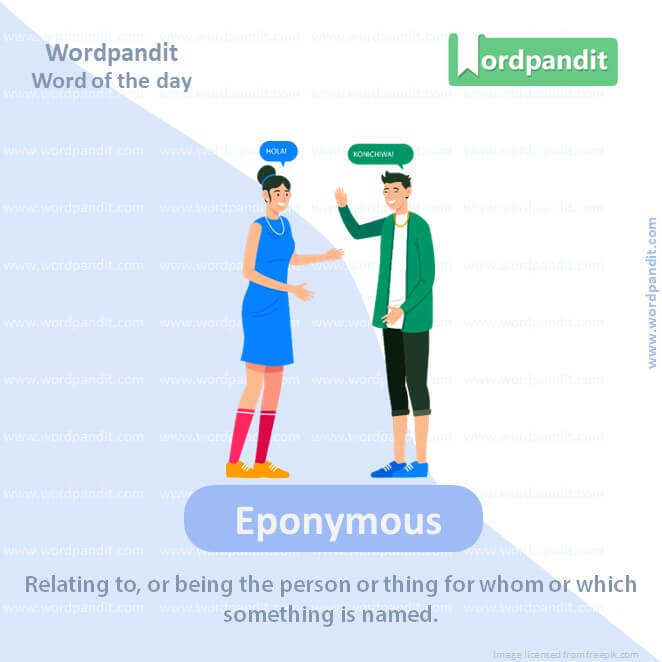Daily Vocabulary Words: List of Daily Used Words in Leading Indian Newspapers
Hi there. Welcome to this special section @ Wordpandit. Our endeavour here is straightforward: highlighting daily vocabulary words that you would come across in leading newspapers in the country. We have included the following newspapers in our selection:
• The Times of India
• The Economic Times
• Hindustan Times
• Mint
• Indian Express
We are putting in extensive work to develop your vocabulary. All you have to do is be regular with this section and check out this post daily. This is your repository of commonly used words; essentially, we are posting a list of daily used words. Hence, this has significant practical application as it teaches you words that are commonly used in leading publications mentioned above.
Visit the website daily to learn words from leading Indian newspapers.
WORD-1: Non-arbitrariness
CONTEXT: It involves the right to fairness, reasonableness, justness and non-arbitrariness
SOURCE: Indian Express
EXPLANATORY PARAGRAPH: Imagine you have a set of rules for a game that everyone has to follow, but sometimes the rules change randomly without reason. That’s like “non-arbitrariness.” It means making decisions or rules that are fair and consistent, without randomness or favoritism, like always following the same rules when playing a game.
MEANING: The quality of being fair and consistent, without randomness or favoritism (noun).
PRONUNCIATION: non-ahr-bi-TRAIR-ee-nis
SYNONYMS: Fairness, consistency, impartiality, objectivity, justness, equitability
USAGE EXAMPLES:
1. The judge’s ruling was praised for its non-arbitrariness and adherence to the law.
2. The company’s policies aim for non-arbitrariness in hiring and promotions.
3. In a democracy, decisions should be made with a principle of non-arbitrariness.
4. The teacher’s grading system was designed for non-arbitrariness and transparency.
WORD-2: Curtailment
CONTEXT: the Fourteenth Amendment guaranteed, in addition to the right to equality, the right to life and liberty. It prohibited their curtailment without the due process of law.
SOURCE: Indian Express
EXPLANATORY PARAGRAPH: Imagine you have a big list of things you want to do during the day, but suddenly you have less time because you have to go to bed early. That’s like “curtailment.” It means cutting back or reducing something, like having less time to play because you have homework to finish or fewer toys to play with because some got lost.
MEANING: The act of reducing or limiting something (noun).
PRONUNCIATION: kur-tayl-muhnt
SYNONYMS: Reduction, limitation, restriction, decrease, cutback, diminishment
USAGE EXAMPLES:
1. The curtailment of funding for the arts affected many cultural programs.
2. The curtailment of civil liberties during wartime is a contentious issue.
3. The curtailment of his vacation plans disappointed him.
4. The company announced a curtailment of employee benefits due to financial difficulties.

WORD-3: Unequivocal
CONTEXT: On December 7, 1948, Article 21 was adopted as Ambedkar failed to take an unequivocal position in favour of due process. Bakshi Tek Chand termed Ambedkar’s act as “one of great mysteries”.
SOURCE: Indian Express
EXPLANATORY PARAGRAPH: Imagine someone telling you exactly what they want for their birthday without any confusion or doubt. That’s like something “unequivocal.” It means being very clear and direct, leaving no room for misunderstanding or doubt, like a straight line on a map showing exactly where to go.
MEANING: Leaving no doubt; unambiguous; clear and straightforward (adjective).
PRONUNCIATION: uhn-i-KWIV-uh-kuhl
SYNONYMS: Clear, definite, unambiguous, unmistakable, clear-cut, categorical
USAGE EXAMPLES:
1. The CEO’s support for the project was unequivocal; she made it clear it was a top priority.
2. The witness’s testimony was unequivocal and left no room for doubt.
3. He gave her an unequivocal answer to her question.
4. The judge’s instructions to the jury were unequivocal and easy to understand.
WORD-4: Pretences
CONTEXT: K T Shah feared that people would be detained without trial on false pretences. The last 70 years have proved these Constituent Assembly members right.
SOURCE: Indian Express
EXPLANATORY PARAGRAPH: Imagine you’re playing pretend with your friends, pretending to be pirates sailing the high seas. That’s like “pretences.” It means acting or pretending to be something you’re not, like pretending to be sick to skip school or pretending to like a food you actually don’t.
MEANING: False display or show; pretending or feigning (noun).
PRONUNCIATION: pri-TEN-siz
SYNONYMS: Pretense, simulation, sham, deceit, deception, guise
USAGE EXAMPLES:
1. She saw through his pretences and knew he was lying.
2. The politician’s pretences of concern for the environment were seen as insincere.
3. His pretences of innocence fooled no one; everyone knew he was guilty.
4. The actor’s pretences at being a serious intellectual were laughable.
WORD-5: Overemphasising
CONTEXT: After independence, starting from its regressive judgment in A K Gopalan (1950) to ADM Jabalpur (1976), the SC contributed to undermining the due process by overemphasising the literal meaning of procedure established by law.
SOURCE: Indian Express
EXPLANATORY PARAGRAPH: Imagine you’re telling a story, and you keep repeating the same part over and over, making it seem more important than it really is. That’s like “overemphasizing.” It means giving too much importance or attention to something, like talking too much about a small mistake or making a small problem seem much bigger than it actually is.
MEANING: Placing excessive importance or attention on something; giving too much emphasis to something (verb).
PRONUNCIATION: oh-ver-EM-fuh-sahyz-ing
SYNONYMS: Exaggerating, overstating, magnifying, amplifying, inflating, hyperbolizing
USAGE EXAMPLES:
1. The manager was accused of overemphasizing the importance of punctuality.
2. She tended to overemphasize the difficulties of the task, making it seem impossible.
3. The media’s coverage of the scandal was criticized for overemphasizing minor details.
4. The teacher warned against overemphasizing memorization at the expense of understanding.

WORD-6: Accolades
CONTEXT: The death of a celebrated writer is an occasion to mourn losses — of her genius, the excellence of her craft, her prodigious intellect, the accolades that she had won over her lifetime, the circumstances of her writing life.
SOURCE: Indian Express
EXPLANATORY PARAGRAPH: Imagine you’ve just finished painting a beautiful picture, and everyone claps and cheers because they love it so much. That’s like “accolades.” It means praise or recognition for something you’ve done well, like winning a medal for running fast or getting a certificate for being a good student.
MEANING: A tangible symbol signifying approval or distinctioin (noun).
PRONUNCIATION: AK-uh-laydz
SYNONYMS: Praise, commendation, applause, recognition, honor, tribute
USAGE EXAMPLES:
1. The actor received many accolades for her performance in the movie.
2. Winning the competition brought him accolades from his peers.
3. The artist’s work earned him critical accolades from art critics.
4. The team’s victory was celebrated with accolades from the fans.

WORD-7: Prodigious
CONTEXT: The death of a celebrated writer is an occasion to mourn losses — of her genius, the excellence of her craft, her prodigious intellect, the accolades that she had won over her lifetime, the circumstances of her writing life.
SOURCE: Indian Express
EXPLANATORY PARAGRAPH: Imagine someone who can eat a whole pizza by themselves in one sitting. That’s like something “prodigious.” It means something that’s very impressive or big, like a giant cake with many layers or a baby who can walk at just six months old.
MEANING: Remarkably or impressively great in extent, size, or degree (adjective).
PRONUNCIATION: pruh-DIJ-uhs
SYNONYMS: Enormous, colossal, immense, vast, huge, extraordinary
USAGE EXAMPLES:
1. The child showed prodigious talent in playing the piano at such a young age.
2. The scientist made prodigious discoveries that changed the field of medicine.
3. The athlete’s prodigious strength allowed him to lift weights that seemed impossible for others.
4. She possessed a prodigious memory, able to recall details from years ago.

WORD-8: Leitmotif
CONTEXT: a sense of being seen, heard, or perhaps, simply reassured about the universality of emotions, whose surfeit or absence forms the leitmotif of everyday life.
SOURCE: Indian Express
EXPLANATORY PARAGRAPH: Imagine watching a movie and hearing the same music every time a certain character appears on screen. That’s like a “leitmotif.” It’s a recurring theme or idea that keeps coming back, like a special symbol or phrase that represents something important in a story.
MEANING: A recurrent theme throughout a musical or literary composition, associated with a particular person, idea, or situation (noun).
PRONUNCIATION: LYTE-moh-teef
SYNONYMS: Motif, theme, recurrent theme, recurring idea, refrain, pattern
USAGE EXAMPLES:
1. The leitmotif of loss and redemption runs through the entire novel.
2. The composer used a leitmotif to represent the main character in the opera.
3. The leitmotif of love and sacrifice pervades the film.
4. The leitmotif of freedom recurs throughout the political speeches.
WORD-9: Omniscience
CONTEXT: What Munro held back from — most of the time — was omniscience, the writerly, almost patriarchal, tendency to explain the lives of protagonists back to them.
SOURCE: Indian Express
EXPLANATORY PARAGRAPH: Imagine someone who knows everything – what you had for breakfast, where you hid your toys, even what you’re thinking right now. That’s like “omniscience.” It means knowing absolutely everything, like a superhero with super-smarts or a character in a story who knows all the secrets.
MEANING: The state of knowing everything; having complete or unlimited knowledge (noun).
PRONUNCIATION: om-NISH-uhns
SYNONYMS: All-knowingness, infinite knowledge, total knowledge, supreme wisdom
USAGE EXAMPLES:
1. The god in many religions is believed to have omniscience, knowing all things.
2. The detective’s reputation for omniscience made him seem almost supernatural.
3. The author wrote from the perspective of omniscience, knowing the thoughts and actions of all the characters.
4. In the story, the wizard possessed the gift of omniscience, seeing past, present, and future.

WORD-10: Eponymous
CONTEXT: That despite their setting in rural Canada, their stories resonated with readers across the world? In the story ‘Too Much Happiness’ about the mathematician and writer Sophia Kovalevsky, from the eponymous anthology, Munro writes, “Always remember that when a man goes out of the room, he leaves everything in it behind… When a woman goes out she carries everything that happened in the room along with her.”
SOURCE: Indian Express
EXPLANATORY PARAGRAPH: Imagine a book with a title that’s also the name of the main character, like “Alice in Wonderland.” That’s like “eponymous.” It means something that’s named after a person, like a company named after its founder or a song named after the singer.
MEANING: relating to, or being the person or thing for whom or which something is named
PRONUNCIATION: ih-PON-uh-muhs
SYNONYMS: Self-titled, self-named, named after, titled after, named for
USAGE EXAMPLES:
1. The band’s eponymous album featured their biggest hit song.
2. The restaurant was named after its eponymous founder, who was a famous chef.
3. The city’s main square is named after its eponymous founder.
4. The movie’s title was the same as the eponymous character’s name.
Vocabulary Daily Words
Among the myriad aspects of language learning, the role of ‘vocabulary daily words’ attests to their undeniable importance. These everyday words form the bedrock of communication. Whether used in casual chat or formal discussion, the fluency and understanding of ‘vocabulary daily words’ can significantly uplift the quality of interaction. However, the vital question is, how to effectively learn these ‘vocabulary daily words’?
The crux of learning ‘vocabulary daily words’ lies in a well-rounded approach that encompasses exposure, understanding, memorization, and practice. Rote memorization might seem like a quick solution, but it lacks context and, thereby, retention. Hence, opt for a diverse range of resources like books, newspapers, podcasts, and digital media. These will bring ‘vocabulary daily words’ to life, providing real-life usage examples and making the learning process inherently engaging.
Next, using memory-enhancing techniques can significantly improve retention of ‘vocabulary daily words’. Techniques such as flashcards or the Leitner System align with the principles of spaced repetition, allowing more effective and long-term learning. Incorporating mnemonic devices, associating new words with unique stories or images, can further facilitate this learning process.
The key to fully grasping ‘vocabulary daily words’ lies in practical usage. Make it a habit to use these words in your daily communications. Whether it’s a friendly conversation, a professional email, or a social media post, try integrating these new words. Doing so provides hands-on practice, strengthening your comprehension and application of these words.
In a nutshell, ‘vocabulary daily words’ are a treasure in the language learning landscape. By harnessing diversified resources, utilizing memory techniques, and actively using these words, your grip on the ‘vocabulary daily words’ will strengthen significantly. So, turn the pages, hit play, start a conversation, and let these ‘vocabulary daily words’ shape the story of your linguistic journey.













